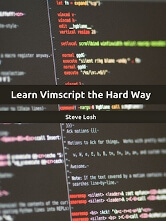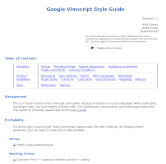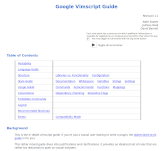Last Updated on May 22, 2022
VimL is a powerful scripting language of the Vim editor. You can use this dynamic, imperative language to design new tools, automate tasks, and redefine existing features of Vim. At an entry level, writing VimL consists of editing the vimrc file. Users can mould Vim to their personal preferences. But the language offers so much more; writing complete plugins that transform the editor. Learning VimL also helps improve your efficiency in every day editing.
VimL supports many common language features: variables, control structures, built-in functions, user-defined functions, expressions first-class strings, high-level data structures (lists and dictionaries), terminal and file I/O, regex pattern matching, exceptions, as well as an integrated debugger. Vim’s runtime features are written in VimL.
VimL is often known as Vimscript or Vim script.
1. Learn Vimscript the Hard Way by Steve Losh
 Learn Vimscript the Hard Way is an informative book for users of the Vim text editor who want to learn how to customize it.
Learn Vimscript the Hard Way is an informative book for users of the Vim text editor who want to learn how to customize it.
It is not a guide to using Vim. Before reading this book you should be comfortable editing text in Vim and know basic Vim terminology like “buffer”, “window”, “normal mode”, “insert mode” and “text object”. To use this book you should have the latest version of Vim installed, which is version 7.3 at the time of this writing. New versions of Vim are almost always backwards-compatible, so everything in this book should work fine with anything after 7.3 too.
Sections cover:
- Basic Vim commands that you can use in your ~/.vimrc file to customize Vim quickly and easily.
- Looks more deeply at Vimscript as a programming language, exploring variables, conditionals, comparisons, looping, functions, strings, string functions and more.
- Create a full plugin for a programming language from scratch – the Potion programming language, a very small language.
The HTML version of the book can be distributed on the condition that no changes are made and no charge levied.
2. Google Vimscript Style Guide by Nate Soares, Joshua Hoak, David Barnett
 Every major open-source project has its own style guide: a set of conventions (sometimes arbitrary) about how to write code for that project. It’s much easier to understand a large codebase when all the code in it is in a consistent style.
Every major open-source project has its own style guide: a set of conventions (sometimes arbitrary) about how to write code for that project. It’s much easier to understand a large codebase when all the code in it is in a consistent style.
Google’s guide covers strings, matching strings, regular expressions, dangerous commands, fragile commands, and catching exceptions. It offers general guidelines covering messaging, type checking, Python, other languages, boilerplate, plugin layout, functions, commands, autocommands, mappings, and settings.
The style guide is licensed under the CC-By 3.0 License, which encourages you to share the document.
3. Google Vimscript Guide by Nate Soares, Joshua Hoak, David Barnett
 This is the in-depth vimscript guide. If you’re just a casual user looking to write a plugin, the abbreviated style guide is for you.
This is the in-depth vimscript guide. If you’re just a casual user looking to write a plugin, the abbreviated style guide is for you.
This rather rotund guide dives into justifications and clarifications. It provides an idealized set of rules that are rather too draconian to push on casual scripters.
It’s for users who want to know why certain decisions were made in the abbreviated guide and who want to learn a thing or two about using vimscript safely.
All books in this series:
| Free Programming Books | |
|---|---|
| Ada | ALGOL-like programming language, extended from Pascal and other languages |
| Agda | Dependently typed functional language based on intuitionistic Type Theory |
| Arduino | Inexpensive, flexible, open source microcontroller platform |
| Assembly | As close to writing machine code without writing in pure hexadecimal |
| Awk | Versatile language designed for pattern scanning and processing language |
| Bash | Shell and command language; popular both as a shell and a scripting language |
| BASIC | Beginner’s All-purpose Symbolic Instruction Code |
| C | General-purpose, procedural, portable, high-level language |
| C++ | General-purpose, portable, free-form, multi-paradigm language |
| C# | Combines the power and flexibility of C++ with the simplicity of Visual Basic |
| Clojure | Dialect of the Lisp programming language |
| ClojureScript | Compiler for Clojure that targets JavaScript |
| COBOL | Common Business-Oriented Language |
| CoffeeScript | Transcompiles into JavaScript inspired by Ruby, Python and Haskell |
| Coq | Dependently typed language similar to Agda, Idris, F* and others |
| Crystal | General-purpose, concurrent, multi-paradigm, object-oriented language |
| CSS | CSS (Cascading Style Sheets) specifies a web page’s appearance |
| D | General-purpose systems programming language with a C-like syntax |
| Dart | Client-optimized language for fast apps on multiple platforms |
| Dylan | Multi-paradigm language supporting functional and object-oriented coding |
| ECMAScript | Best known as the language embedded in web browsers |
| Eiffel | Object-oriented language designed by Bertrand Meyer |
| Elixir | Relatively new functional language running on the Erlang virtual machine |
| Erlang | General-purpose, concurrent, declarative, functional language |
| F# | Uses functional, imperative, and object-oriented programming methods |
| Factor | Dynamic stack-based programming language |
| Forth | Imperative stack-based programming language |
| Fortran | The first high-level language, using the first compiler |
| Go | Compiled, statically typed programming language |
| Groovy | Powerful, optionally typed and dynamic language |
| Haskell | Standardized, general-purpose, polymorphically, statically typed language |
| HTML | HyperText Markup Language |
| Icon | Wide variety of features for processing and presenting symbolic data |
| J | Array programming language based primarily on APL |
| Java | General-purpose, concurrent, class-based, object-oriented, high-level language |
| JavaScript | Interpreted, prototype-based, scripting language |
| Julia | High-level, high-performance language for technical computing |
| Kotlin | More modern version of Java |
| LabVIEW | Designed to enable domain experts to build power systems quickly |
| LaTeX | Professional document preparation system and document markup language |
| Lisp | Unique features - excellent to study programming constructs |
| Logo | Dialect of Lisp that features interactivity, modularity, extensibility |
| Lua | Designed as an embeddable scripting language |
| Markdown | Plain text formatting syntax designed to be easy-to-read and easy-to-write |
| Objective-C | Object-oriented language that adds Smalltalk-style messaging to C |
| OCaml | The main implementation of the Caml language |
| Pascal | Imperative and procedural language designed in the late 1960s |
| Perl | High-level, general-purpose, interpreted, scripting, dynamic language |
| PHP | PHP has been at the helm of the web for many years |
| PostScript | Interpreted, stack-based and Turing complete language |
| Prolog | A general purpose, declarative, logic programming language |
| PureScript | Small strongly, statically typed language compiling to JavaScript |
| Python | General-purpose, structured, powerful language |
| QML | Hierarchical declarative language for user interface layout - JSON-like syntax |
| R | De facto standard among statisticians and data analysts |
| Racket | General-purpose, object-oriented, multi-paradigm, functional language |
| Raku | Member of the Perl family of programming languages |
| Ruby | General purpose, scripting, structured, flexible, fully object-oriented language |
| Rust | Ideal for systems, embedded, and other performance critical code |
| Scala | Modern, object-functional, multi-paradigm, Java-based language |
| Scheme | A general-purpose, functional language descended from Lisp and Algol |
| Scratch | Visual programming language designed for 8-16 year-old children |
| SQL | Access and manipulate data held in a relational database management system |
| Standard ML | General-purpose functional language characterized as "Lisp with types" |
| Swift | Powerful and intuitive general-purpose programming language |
| Tcl | Dynamic language based on concepts of Lisp, C, and Unix shells |
| TeX | Markup and programming language - create professional quality typeset text |
| TypeScript | Strict syntactical superset of JavaScript adding optional static typing |
| Vala | Object-oriented language, syntactically similar to C# |
| VHDL | Hardware description language used in electronic design automation |
| VimL | Powerful scripting language of the Vim editor |
| XML | Rules for defining semantic tags describing structure ad meaning |
